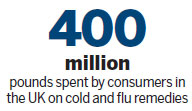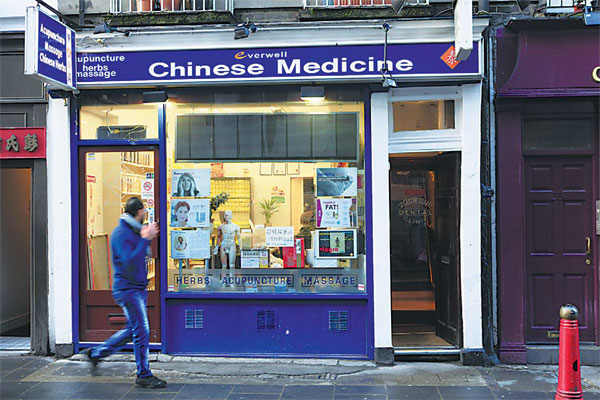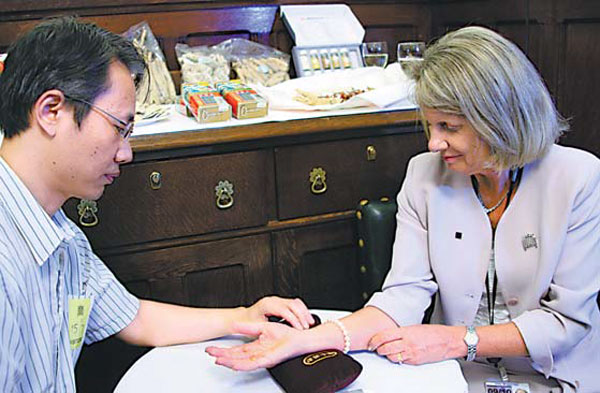Healthy development diagnosis for TCM's future in Europe
Updated: 2015-06-26 06:40
By Zhang Chunyan(China Daily Europe)
|
|||||||||||
Companies collaborate to sell popular flu remedy on the British market
An application to sell a well-known Chinese cold and flu remedy in Britain has sent a positive signal for manufacturers of traditional Chinese medicine looking to enter European markets, but challenges remain, industry experts say.
The UK Medicines and Healthcare Products Regulatory Agency received a request to approve Isatis Cold and Flu Relief, based on the Chinese product Ban Lan Gen, in June. Phynova, a life sciences company based in Oxford, submitted the application in collaboration with Xiangxue Pharmaceuticals Co Ltd, a leader in the modernization of TCM.
|
A traditional Chinese medicine store in London. Unlike Western medicines, which often contain a single chemical compound, TCM have on average 20 ingredients. Provided to China Daily |
|
A traditional Chinese medicine doctor checks the pulse of a patient in the UK. Provided to China Daily |
"It is a safe and effective product for cold and flu, and we think it'll be welcomed in the UK when the product is approved," Robert Miller, CEO of Phynova, says.
Ban Lan Gen, which is derived from the root of a flowering plant called woad, or Isatis tinctoria, has been a popular flu remedy in China for many years. In 2003, it made headlines when people began using it en masse during the SARS epidemic, and again several years later during outbreaks of swine flu and avian flu.
"For application, we've worked closely with Phynova to ensure the product satisfies the European Union's Good Manufacturing Practice requirements, and that the materials were in line with regulatory requirements," Wang Yonghui, chairman of Xiangxue, says. "Phynova is committed to the development and commercialization of herbal products and TCM. Xiangxue looks forward to further collaboration to introduce more safe and effective TCM into the EU market."
The MHRA, which could make its decision in 210 days, is responsible for ensuring the safety of medicines and medical devices on sale in the UK. The agency drafted the EU Traditional Herbal Medicinal Product Directive, released in 2004 to protect consumers and ensure treatments meet high standards. This led to many TCM products no longer being available over the counter in Europe.
However, the market is massive. In the UK alone, consumers each year spend almost 400 million pounds ($630 million; 561 million euros) on cold and flu remedies, and industry insiders say the demand for natural remedies is stronger now than ever.
TCM, which has evolved over 4,000 years, relies largely on patented and herbal medications to prevent illness and help fight ailments, as well as relieve pain and restore balance - the ying and the yang - to the body.
Prior to its latest application, Phynova obtained the first MHRA approval for a TCM product to be sold over the counter in Britain. "Since that product - Phynova Joint and Muscle Relief Tablets - was approved in February, we have increased in confidence toward the TCM product registration process," Miller says.
The active ingredient in the tablets is a plant called Siegesbeckia orientalis, which is prepared by Purapharm Pharmaceutical Co in Nanning, capital of China's Guangxi Zhuang autonomous region, and shipped to Surapharm Services Ltd in Britain for manufacture.
Phynova, founded in 2002, specializes in developing new medicines and registering them with the authorities. The company employs 10 scientists in the UK and six in China. Its operation in China grew after it invested in Botanic Century Co, a life sciences company in Beijing, in 2006.
Xiangxue specializes in the development and modernization of TCM products and is the first company to establish a TCM research and development center outside of China, opening a base in Cambridge. Thanks to its collaboration with Phynova, it is also the first Chinese pharmaceutical company to have access to Europe's lucrative over-the-counter market.
"As a Chinese company, it is essential for us to have a European partner to increase our chance to succeed," Wang says.
Miller adds: "We've established good cooperative relations over the past several years, and we'll work together in the future to bring more safe and effective TCM products to Western markets."
The application of Isatis Cold and Flu Relief sends a healthy message for companies making TCM products, yet industry expert Robert Verkerk warns that obstacles may stand in the way of similar applications.

"It is a positive development that products related to TCM can be made more widely available to the EU market," says the executive director of the Alliance for Natural Health International, a UK-based international NGO that promotes natural and sustainable approaches to healthcare. "However, this new application for Isatis is for a single herb, like its predecessor the Sigesbeckia-based product for joint and muscle relief. Single herb products are by and large considerably easier and cheaper to register and are not the typical multi-component formulas associated with TCM."
As Miller explains, there are technical difficulties involved with manufacturing TCM to the EU Good Manufacturing Practice standards as well as many other points to consider, such as passing the toxicological assessment.
"For a product to be approved, the applicant has to demonstrate evidence of use of the main ingredient over the past 30 years, including 15 in the EU," he says.
Unlike Western medicines, which normally contain a single chemical compound, TCM have on average 20 ingredients, and each ingredient may contain several compounds.
However, "from our experience, the MHRA has been helpful in guiding us through the application process", Miller adds. "By working with the UK authority, we will continue to register more TCM products."
zhangchunyan@chinadaily.com.cn
(China Daily European Weekly 06/26/2015 page21)
Today's Top News
Plans to fight climate change expected
Trips underline close ties between nations
Biggest swing since 1992 sends stocks lower
Tsinghua, PKU slam each other in public to lure top students
Premier Li starts European visit to find economic synergies
China gets 30% stake in AIIB
Yuan can boost stability in Eurasia
Taiwan investigates blaze
Hot Topics
Lunar probe , China growth forecasts, Emission rules get tougher, China seen through 'colored lens', International board,
Editor's Picks

|

|

|

|

|

|








